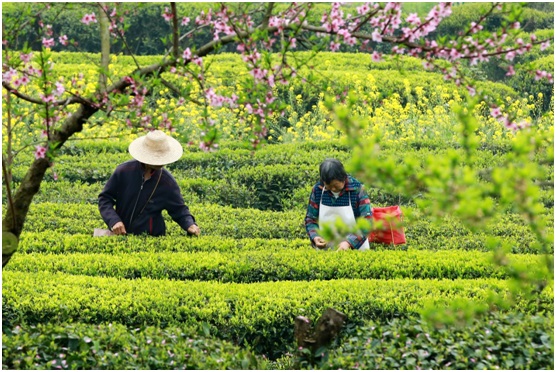By He Guanghua, Fan Haotian, People’s Daily
The farmland of Hubei province, the worst-hit region in China by COVID-19, is getting alive again as spring takes everything to rebirth and renewal.
To ensure synergetic progress of economic and social development and epidemic control, spring ploughing is carried out across the province in an orderly manner. Farmers in villages with no case of infection can work on the farmland with necessary protection after temperature checks, while those in villages with confirmed cases are also able to farm with strict control and quarantine measures.
A total of 130,000 tea planters in Hubei’s Wufeng Tujia Autonomous County, one of the first counties evaluated with low risks of COVID-19, are nowadays picking tea leaves in the mountain.
Tan Congxin, who runs a 4,000-square meter tea plantation in the county, was quite concerned about the sales of his tea garden in this unusual spring though the tea leaves are sprouting fast as temperature climbs.
“Can we still earn from it this year?” Tan asked Chen Hua, Party chief of Wufeng Tujia Autonomous County when the latter was on an inspection tour of epidemic control in the county.
“Of course!” Chen replied, adding that the government will go all-out to figure a way out during the epidemic.
Wufeng is an extremely impoverished county which relies heavily on its 14,600-hectare tea plantation for poverty alleviation. Tea planting concerns the livelihood and employment of nearly 70 percent of the county’s population.
According to Tan who later visited a purchasing station from his home in Kuzhuping village, Caihua township, tea farmers were requested to stay at least 2 meters away from each other, and they must stand in lines, have their body temperatures checked and register information before selling the tea leaves.
He told People’s Daily on March 22 that he earned 5,000 yuan selling what he picked in the past half month, lower than usual, but he can make it with the support from the government.
“Moss is growing fast with the fine weathers, which keeps us busy all day,” said Jiang Yiqiong, a villager from Mamianchong village, Baimiaohe township of Luotian county, who hired several workers to help her with water changing, disinfection, feeding, and removing moss in the rice fields where she breeds crayfish.
Mamianchong village, as one without confirmed cases, made a farming schedule at the end of last month, allowing villagers to work in shifts based on the size of rice fields and labor condition of each household. “Now we don’t have to work in shifts any more, and are also allowed to hire workers to help us,” Jiang said.
Hubei is home to 533,333 hectares of aquaculture sites, and a leading province of freshwater aquaculture yielding 4.69 million tons of aquatic products last year.
To avoid the impacts from COVID-19 on production, counties and cities in the province relying on the industry drained their brains to dispatch materials and supplies. As a result, 80 percent of the ponds in these regions were put in with fry weighing 235,000 tons.
The village committee of Jingdong village, Duodao district of Jingmen is now offering delivery services to villagers. Li Xueqi is one that benefits from it, saying the timely delivery of seeds greatly facilitated the spring ploughing.
According to him, village cadres would help villagers purchase farming materials and deliver them to the doors after receiving the latter’s message on WeChat.
Farming machineries play a key role in spring ploughing. Dangyang in western Hubei has launched one-stop online service to help farmers reach farming machinery cooperatives. So far, over 800,000 machineries have been put into use in Hubei for farming, ploughing 2,667 square kilometers of farmland.
Besides, to fill the shortage of fertilizer, 24 phosphatic fertilizer producers in Yichang, Jingmen and other cities in the province have restarted production, restoring over 80 percent of their capacity.
Farmers pick tea leaves at a tea plantation in Jiandong village, Maoping county of Yichang, Hubei province, March 22, 2020. Photo by Wang Gang, People’s Daily Online












Leave a Comment